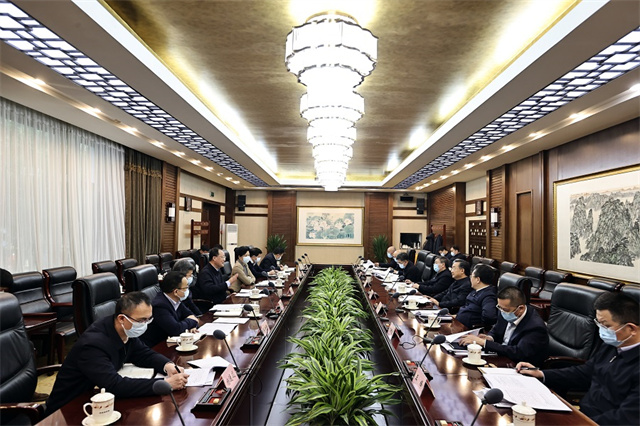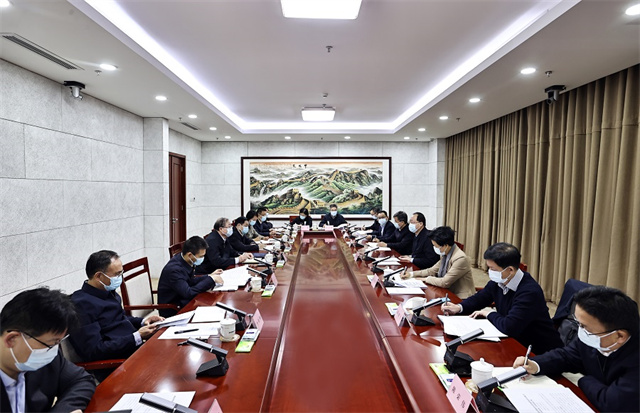On February 6, the Hunan government held meetings with the Ministry of Agriculture and Rural Affairs (MARA) and the National Rural Revitalization Administration (NRRA) in Beijing respectively. They had in-depth exchange of views on fully implementing the spirit of the 20th CPC National Congress and the Central Rural Work Conference, building Hunan into an agriculture powerhouse, and advancing rural revitalization. Mao Weiming, deputy secretary of the CPC Hunan Provincial Committee and governor of the People's Government of Hunan Province, and Tang Renjian, minister of MARA, attended.

On the morning of February 6, the Hunan government held a meeting with MARA in Beijing. Mao Weiming, deputy secretary of the CPC Hunan Provincial Committee and governor of the People's Government of Hunan Province, and Tang Renjian, minister of MARA, attended. (Photo/Liu Shangwen, Hunan Daily)
Deng Xiaogang, vice-minister of MARA; Liu Huanxin, head of NRRA; Zhang Yingchun, member of the Standing Committee of the CPC Hunan Provincial Committee and vice governor of the People's Government of Hunan Province; and Qu Hai, member of the CPC Leadership Group of the People's Government of Hunan Province, attended.
During the meeting, Mao Weiming thanked MARA and NRRA for their support to Hunan. He said, in the past year, Hunan adhered to following the guidance of Xi Jinping Thought on Socialism with Chinese Characteristics for a New Era. The province's main economic indicators have made progress despite difficulties, registered steady economic growth with a sound momentum, were better than the national average, and achieved better-than-expected results. In 2022, Hunan's GDP hit 4.87 trillion yuan, an increase of 4.5%. The growth rate was 1.5 percentage points higher than the national level. Hunan ranked second among the top ten economically developed provinces. The growth rates of such indicators as large industrial enterprises, investment, and consumption were all higher than the national average. Imports and exports increased by 20.2%, exceeding 100 billion USD for the first time.

On the morning of February 6, the Hunan government held a meeting with NRRA in Beijing. Mao Weiming, deputy secretary of the CPC Hunan Provincial Committee and governor of the People's Government of Hunan Province, and Liu Huanxin, head of NRRA, attended. (Photo/Liu Shangwen, Hunan Daily)
Mao Weiming said, Hunan's total grain output in 2022 was more than 30 billion kg for three consecutive years, the operating income of the agricultural product processing industry exceeded 2 trillion yuan, and the per capita disposable income of rural residents increased by 6.8%. Mao hoped that MARA will continue to increase support for Hunan in ensuring grain and oil production, promoting seed industry innovation, promoting the popularization and application of agricultural machinery, and cultivating distinctive industries with competitive edges, so as to help Hunan build itself into an agriculture powerhouse.
Mao Weiming said that last year, the province prevented 213,000 people of 85,000 households from falling back into poverty again and helped 2.507 million people who were lifted out of poverty get employed, and the per capita net income increased by 14.4%. He hoped that the National Rural Revitalization Bureau will increase its promotion and support for Hunan's efforts, and give more pilot guidance and policy support in the areas of joint construction of industrial parks, follow-up support for those who have been relocated from inhospitable areas, and nearby employment.
Tang Renjian said, MARA will thoroughly study and implement President Xi Jinping's important expositions and instructions on agriculture, rural areas, and farmers. Focusing on the top priority of grain production and the central task of increasing farmers' income, MARA will join hands with Hunan to promote various key tasks.
Liu Huanxin said that NRRA will work with Hunan to tap into, publicize and promote the typical experience of Shibadong Village; further increase the popularity of the brand of targeted poverty alleviation; and, support Hunan in exploring new models of rural revitalization in terms of pilot work and preferential policies.
This article is from the Hunan Provincial Government www.enghunan.gov.cn.
Translator: Xiao Juan
Chinese source: hunan.gov.cn








